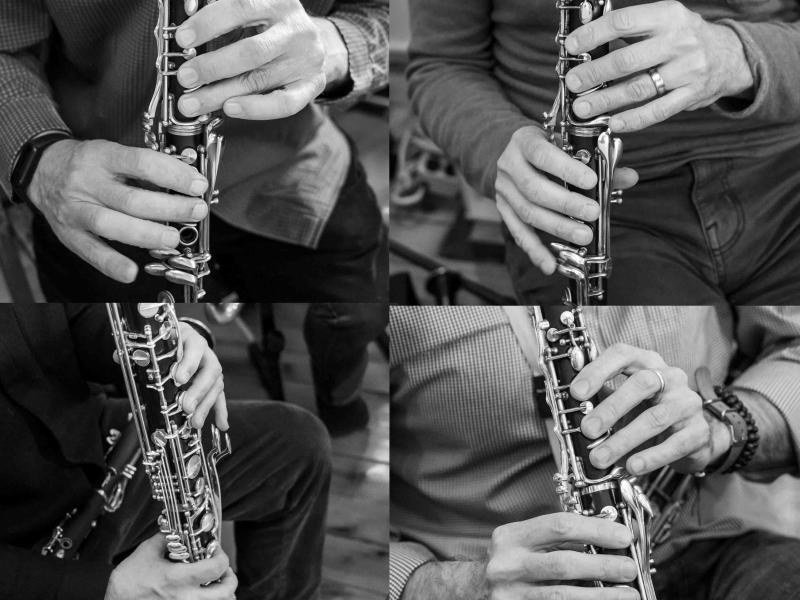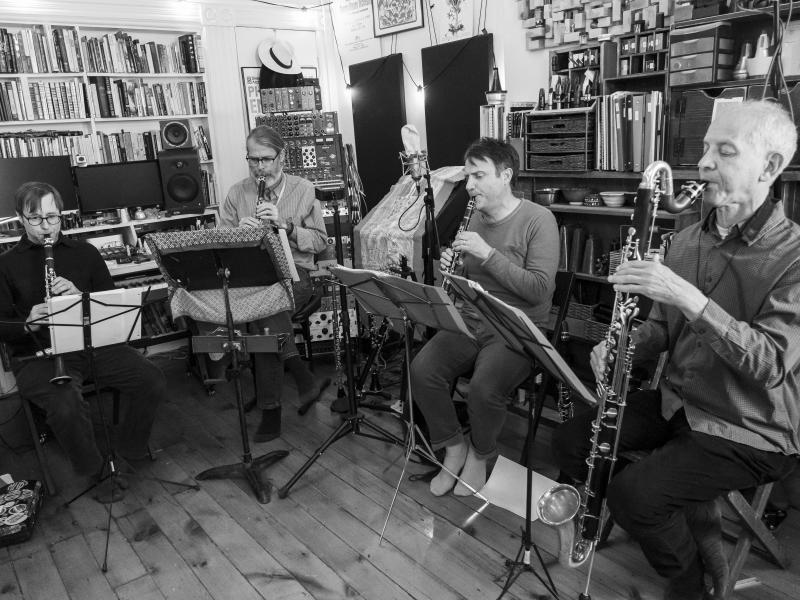Projects: Reed Basket
Reed Basket is an all-clarinet all-the-time quartet, with Andy Biskin, Peter Hess, Mike McGinnis, and Sam Sadigursky.
"While the clarinet may not be experiencing a full-bore resurgence, it certainly appears in jazz circles with increasing frequency these days. Biskin was ahead of the curve, long gifted at balancing his musical-Americana fixation with side trips into regions unexplored. For this Stone residency, Biskin fronts an assembly of idiosyncratic small groups, including the similarly inclined clarinet quartet Reed Basket." –The New Yorker
An essay in clarinet curiosity, Andy Biskin’s musical basket is filled with sounds from five types of clarinets played by Biskin and three other top New York reedists whose skills encompass jazz, new music, pop and ethnic sounds.
Besides Biskin’s alternately rhapsodic, rhythmic and quirky originals, Reed Basket recasts tunes as diverse as classic jazz standards— such as Jelly Roll Morton’s “Wolverine Blues” and Pee Wee Russell’s “Wailin’ DA Blues”—with Lou Reed’s “Walk on the Wild side”, Lerner and Loewe’s “Camelot” and Franz schubert’s “Moment Musicaux #3”. The last is particularly noteworthy because the combination of sopranino clarinet lyricism and a bass clarinet continuum turn the Austrian composer’s piece into a near klezmer romp, albeit one that could feature Russell as soloist. Interestingly, “Wailin’ DA Blues”, a Russell showpiece, is similarly transformed: from a bedrock of interlocking blues riffs, overlapping individual solos of piercing squeals and twittery flutters, later combining to squirm into a multi-vibrated finale. In reverse, “Walk on the Wild side” is modified from rock anthem to an expressive ballad with clarion reeds propelling the theme, decorated with gentle trills that even replicate the original doo-de-do choruses.
Biskin’s compositions are correspondently diverse, ranging from the pastel tone poem of “Yasmina” to the near-dissonant “So Forth”. The former confirms that softness and syncopation aren’t antagonists, with heartfelt glissandi and tremolo lines circling the group’s moderated forward motion. The latter, featuring four bass clarinets, wallows through basement-level interlocking interchanges with a few altissimo squeaks and mid-range trills added to a four-part unison resolution.
Firmly in the tradition of other multi-reed ensembles like ROVA and the Clarinet Choir, Reed Basket defines an individual direction mostly through Biskin’s out-of-the-ordinary formulations.
Biskin’s arrangements keep the music tight and focused with brief solos, taking advantage of the ranges of the five types of clarinets that are utilized and the players’ versatility. The seven Biskin originals include the whimsical “Easy Chair,” “So Forth” which has four bass clarinets interacting with each other, and “New Fangle,” a scalar piece reminiscent of Raymond Scott. The other six numbers include an intriguing reworking of “Camelot,” a brief but joyful version of a Schubert melody, a tip of the hat of sorts to Pee Wee Russell (“Wailing DA Blues”) and a rollicking “Walk On The Wild Side.” A highpoint is a tribute to clarinetist Johnny Dodds’ version of “Wolverine Blues” with the Jelly Roll Morton Trio including three choruses of Dodds’ solo. Throughout this set, Reed Basket displays the still-unlimited potential of the clarinet. Four Stars.
Andy Biskin is an adventurous musician, to put it mildly. His take on music reflects the influence of Alan Lomax (who he worked with) as well as the sounds of Raymond Scott, old-time fiddle and folk tunes, the quirky melodies and arrangements of Thelonious Monk, and numerous 20th-century classical composers.
Biskin’s “Easy Chair” with its generous mix of voices and loping rhythm, playful interaction among the players, nothing harsh, just fun. In “Camelot”; note how Biskin’s arrangement builds the tension with the various voices playing the bottom lines. There are several solos but the joy of this music is how all the pieces fit into a coherent, certainly playful, performance.
The various “cover tunes” all stand out. The playful polka “Moment Musicaux #3”, from the pen of Franz Schubert, sticks close to the original intent of the composer. The quartet’s take on Pee Wee Russell’s “Wailin’ D.A. Blues” still has the blues feel but one should notice how the arrangement utilizes the different textures of the clarinet, moving in and out of unison, swooping into the higher registers. Everything changes in the last minute: the tune becomes a swinging panorama of sounds all connected to the blues.
Hard not to chuckle upon first hearing Reed’s “Walk on the Wild Side” but this is a serious take on the song. The harmonies are quite lovely, the short solos strong, and the utilization of the different clarinets fills out the sound. The final “cover” is a raucous take on Morton’s “Wolverine Blues”. The spirited romp stays fairly true to the original arrangement; still, it’s a hoot when the quartet breaks the piece down in the middle, adding each reed one by one and going through the tune once more.
Listen now to the closing track. Biskin’s “Minotaur”, opens with just the contra-alto clarinet setting the tempo. Soon, it’s joined by two bass clarinets before one hears the melody. After running through the melody, the solos, by the “higher” clarinets, go from one to the other in a playful call-and-response. Later in the tune, the contra-alto clarinet steps out for the final solo, even getting the final notes.
There’s a lot of playfulness throughout “Reed Basket”. Andy Biskin combines his love for different musical genres with his love for the sound of his chosen instrument, adding a generous dollop of humor, but not satire, to the proceedings. Does not hurt one bit that his co-clarinettists – Mike McGinnis, Sam Sadigursky, and Peter Hess – are masters of their respective reeds. Dig in and dig these great sounds!




